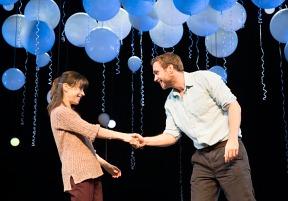Constellations - Duke of York's Theatre 2012
Glancing at my dictionary I see there are various definitions of a constellation - bodies in the universe, a gathering of well-known people, or a configuration of ideas. In the context of this play, I think writer Nick Payne is looking more at the last of those, or even the connection perhaps between the intimate secrets of how the universe functions and how those relate to mere mortals. It is not exactly clear-cut because the strategy and methodology which this play employs is not easy to decipher with total accuracy. It is, nonetheless, fascinating.
The play is based on a scientific notion that we might actually be living in one of many universes which are co-existing simultaneously. So, I may be here writing this review, and another Peter Brown somewhere in another universe is also writing a review, but with a very different perspective, and using completely different words. Or, there may be a universe in which I am not even writing a review, but doing something completely different. The idea suggests a multiverse in which different outcomes to the same event are possible. That provides the conceptual framework for the interactions between the two people in the play.
Marianne and Roland meet at a party. Roland is a beekeeper and Marianne is a scientist working in the field of quantum cosmology and specialising in the CMB (cosmic microwave background). That provides another connection with the universe, too. First, we see Roland and Marianne striking up a conversation when they first encounter each other. Then, the lights flicker a bit, the action freezes, and then we see the same scene repeated. But this time, the characters reactions are different and they use different words to express themselves. We see the same scene repeated three times, before the story moves on and the relationship between Marianne and Roland develops.
On paper, the repetition in 'Constellations' might seem unappealing - after all, watching the same scene several times doesn't sound that exciting. In reality, it is the repetition that provides much of the humour as the characters try new ways to express the same emotion, or the same situation unfolds in a different direction. Once we have seen one version, the next alternative is more humorous as a result.
At around 70 minutes duration, 'Constellations' is certainly short. And that may raise questions about value for money for some. But value is not merely reflected in the running time of a show. What really matters is what happens in that time. First rate acting has to be one of the most important things we all look for in any show, and you are hardly likely to do better than what is on offer here. Sally Hawkins as Marianne and Rafe Spall, as beekeeper Roland, are little short of inspirational as they cope with multiple versions of multiple scenes, each of which varies only marginally within any set. It is the kind of play that one imagines is a nightmare to learn and encompasses the additional trap of potentially falling out of character. However, they are both undaunted either by the technical or emotional challenges the play throws at them, and provide totally absorbing performances. They are aided immensely by first-class direction from Michael Longhurst who keeps everything tightly focused and meticulously timed.
In a way, we have all experienced some aspects of what this play is about. How many times have you asked yourself what the outcome would have been if you had done something differently? Leaving the theatre, it is hard not to think along those lines - and it is not a painless experience. But Nick Payne introduces one element of certainty that none of us can escape, even in a multiverse. It adds a sobering element to the piece and considerable depth.
Intelligent, innovative and powerful, this is a very welcome addition to the West End, and deserves enormous success.
"The stars shine brightly in Nick Payne's metaphysical love story, and I'm not just talking about the bewitching performances of Sally Hawkins and Rafe Spall."
Lyn Gardner for The Guardian
"When the play opened in January, Charles Spencer, awarding it five stars, made glowing comparisons to the work of Tom Stoppard and Michael Frayn. While this 80-minute affair is governed by a neat idea and fizzes with invention, I'd sound a warning note that it's high on promise but relatively light on learning. My hunch is that what must have looked like a huge find in the small space of the Court Upstairs is now in danger of appearing overexposed on a major stage."
Dominic Cavendish for Daily Telegraph
"So why only three stars? The dazzle of the on-off love affair between Sally Hawkins's Sussex University cosmologist, Marianne, and Rafe Spall's affable beekeeper, Roland, was more affecting and surprising first time round in the Court's little upstairs studio, where it was danced out in the middle of us in beautiful geometric patterns. There's now a more deliberate tread about Michael Longhurst's 70-minute production and far less mobility.."
Michael Coveney for Independent
"Ingenious and beautiful...The play lasts a little over an hour, but manages to dazzle, delight and dismay. Truly stellar."
Henry Hitchings for Evening Standard
Originally published on
